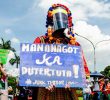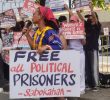Eid’l Fitr marks the end of Ramadhan, the Muslim’s fasting month. Following the lunar calendar, the sighting of the new moon signals the change of month in the Muslim’s Hijrah calendar. For those who feel that they have not fulfilled well this month the 4th pillar of Islam, we still have today and tomorrow to fast, give zakat ‘ul fitra (voluntary material or financial assistance), pray the Salatul Taraweeh (special nightly prayer reciting verses of the Qur’an) and the Salatul Layl or Tahajud Salah (midnight prayer). These are special prayers performed voluntarily in congregational and individual prayers.
All Muslims have fond memories of hardships in fasting during the Ramadhan, and often we compare experiences as if they were battle scars.
My brother made his Ramadhan memorable because this was the time where he was able to help a Balik-Islam(Muslim convert) friend to experience fast and pray the Salatul Taraweeh and the Tahajud.
This year’s Ramadhan might be the most painful for my brother’s childhood friend Mohammed Bansil. Med (short for Mohammed) is the brother of Linda and Najoua Bansil, the filmmakers who were abducted by Abu Sayyaf group last June 22 in Jolo, Sulu while they were doing a documentary. My brother was saddened to learn from Med that until now his family still has no word from his sisters or from his sisters’ captors. It would be a challenge for the two to perform the fast while in captivity and abstain from having negative thoughts about their conditions. We could only pray that the Muslim brothers who abducted them have been enlightened this Ramadhan and decided to free the sisters.
My other brother who resides in Cotabato City had a harrowing experience of the bombing there last Monday. We all had to call him and ask if he or any of our relatives were affected. On August 5, a bomb exploded in a commercial area along the highway of Sultan Kudarat which killed six people including a child and injured 29 bystanders. Although news reports say that the motive was directed against the mayor’s sister and city administrator, Muslims in Cotabato cannot help but be wary of the consequences as military and police authorities mount an investigation.
Yesterday, another bomb exploded in Midsayap, North Cotabato at 3:00 in the morning but the police and military reported no casualties. On July 26, eight people were killed and 30 wounded as a bomb exploded in a big commercial center in Cagayan de Oro City.
In light of the warning issued by the US State Department on August 2 about possible terrorist threats from Al-Qaeda network against US interests in Middle East and North Africa, Muslims fear that as a consequence, state authorities will want to direct their investigations in Moro communities in Mindanao which they suspect of hiding Al-Qaeda terrorist cells.
In the past, this kind of operation has led to the rounding up and detention of innocent Moro civilians as well as heightened military operations in Moro communities.
It is unfair that the thought of a heightened military and police operation hangs in the air as the Moro people await for the the Eid‘l Fitr or the Hari Raya Puasa, the feast marking the end of the Ramadhan.
For Muslims, these harrowing experiences are taken as challenges instead of difficulties while performing the fast. The fast itself reminds Muslims on piety, simple way of life, patience and sacrifices, which should humble Muslims and experience the hardships faced by fellow Muslims who are deprived of liberty and wealth.
I, on the other hand, have stories of my shortcomings this Ramadhan, as a Muslim and a Moro activist. After a decade of organizing in Mindanao, I returned to Manila, facing again Manilenos who know less about the Muslims’ way of life; their chance encounter with Muslims is confined in meeting Moro vendors of DVDs and RTWs.
Most of my colleagues were surprised to learn that I could survive a day without food and drinks, and could refrain from having bad thoughts. Hence, they exploit the whole month knowing that whatever they do, these will not cause my blood to boil.
Health workers who saw me were not concerned about high blood, they were more concerned that I am suffering from anemia. One of my colleagues, a nutritionist, quipped that fasting is not a healthy practice. Abstaining from food, water and even saliva for a day would not help in developing cells in my body. I had to remind her that statistically, no Muslim was reported to having died because of fasting. And that I have been doing this since childhood, and no harm has come to me. I felt I need to assure her that I still eat, hence I was not losing weight. Muslims break the fast around 6:30 in the evening, which we call the Iftar in Arabic language or buka in the local tongue. This would be dinner time for the rest.
So it’s just like reversing the day into night. For the whole month, I am up from two in the morning till ten in the evening. My family would wake up at 2:30 in the morning to prepare our meal for the sahoor or sahul and wait till dawn for the Fajr or prayer at dawn. Then we go to work.
After Iftar, we go to the mosque to pray the congregational prayers Taraweeh and Witr. On the last ten days of Ramadhan, which we call the Laylatul Qadir (Night of Destiny), we would wake up until 12 midnight to pray theTahajud Salah. The prayers pay homage to the nights when the Qur’an was revealed to the Prophet Muhammad.
So that explains the eye bags, the anemic look, and the dozing off and snoring at 11 in the morning or 3 in the afternoon. But I surprised them all that I had the energy to shout “Ibagsak!” at a rally against President’s State of the Nation Address (SONA) on July 23. But everyone was laughing as I dozed off all throughout his speech at the House of Representatives.
After SONA, I met many Mindanaon colleagues who were familiar with the Ramadhan, and so they were surprised to see me eating. I had to explain to them that during menstruation, women are excused from observing the fast because of the imbalanced hormones and dysmenorrhoea.
When I fasted again, two of my Manileno colleagues would save food for me. One was a former political detainee who was imprisoned at Camp Bagong Diwa where most of the Moro men from Mindanao who were suspected of being Abu Sayyaf members are detained. The other was a former political detainee who once staged a protest fast.
One time, they were aghast to learn that the food they hid was missing. First it was the orange for dessert, then the chicken for the main meal. And by the time that I had to eat what was left, a colleague would kid me into sharing my meal. It’s dinner time for the rest.
I feel guilty that my colleagues know less of our culture and religious practices. Most of the Muslim members in our group failed to let our colleagues see the religious side of us being Moro people. The one obvious to them is the activist side, one that is at the forefront of the struggle of the Moro people for the respect of civil and political rights, and espousing right to self-determination. The religious side we would often reserve for our family or for the Muslim community that we were organizing.
I feel that the annual Duyog Ramadhan falls short of making activists of other faith see and experience what the Moro people practice during Ramadhan. We always invite people during the Eid’l Fitr, and so they are more familiar with the feast than with the fast. What should bind Muslims, Christians and Lumads of Mindanao is the similarity of their experiences in times of hardships and challenges they face.
How did the residents of Datu Piang and Datu Zaldy Ampatuan perform the fast while their communities were being bombed by the elements of the 6th Infantry Division to flush out elements of the Bangsamoro Islamic Freedom Fighters? How difficult was it for them to evacuate their areas while on fast?
As for the Moro political detainees imprisoned in Camp Bagong Diwa, how many lonely Ramadhan they had to suffer? For 12 years they were imprisoned in Taguig City, their wives and children waited in Mindanao.
How did the Muslim residents of Maguindanao, Cotabato City, Zamboanga City and Sultan Kudarat Province survive the flash floods this month of Ramadhan? News reports say more than 100,000 families have already evacuated their communities because of the flood.
I also wonder how did the panelists from the Moro Islamic Liberation Front who were fasting debate, stress their points, decide and sign the latest wealth sharing annex to the Framework Agreement on the Bangsamoro in Kuala Lumpur last July 14.
These are stories that would often be glossed over in the media as they report about the conditions of the Moro people. What sells are stories of skirmishes between the military and the Moro liberation groups and the threat of terrorist attacks. What sells are stories which portray Muslims as enemies, as wicked people.
Bangsamoro, Eid’l Fitr, framework agreement, hariraya, milf, mnlf, moro, Ramadan, ramadhan









